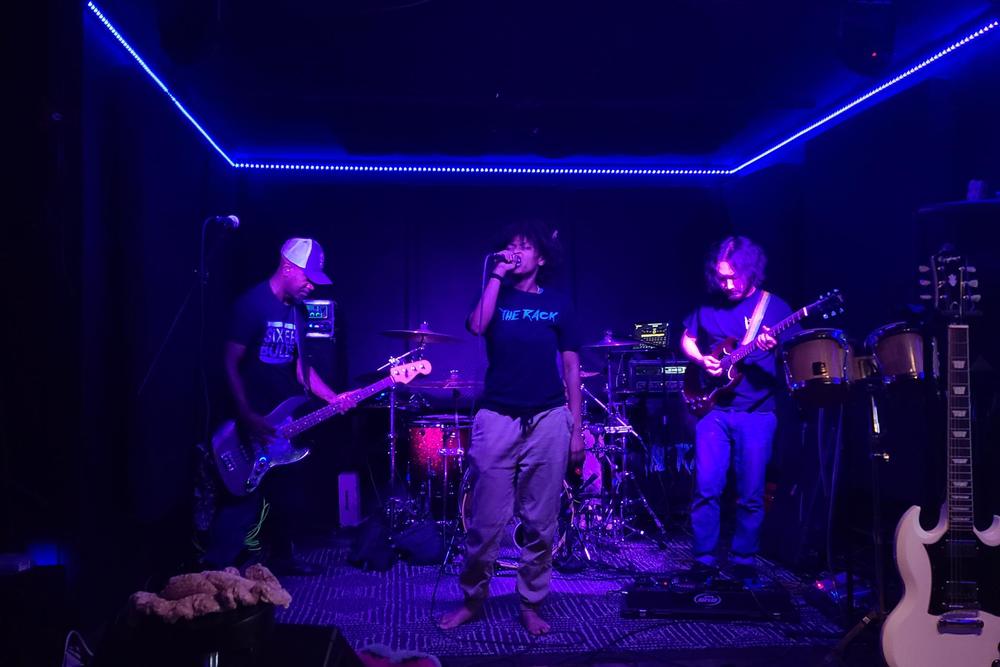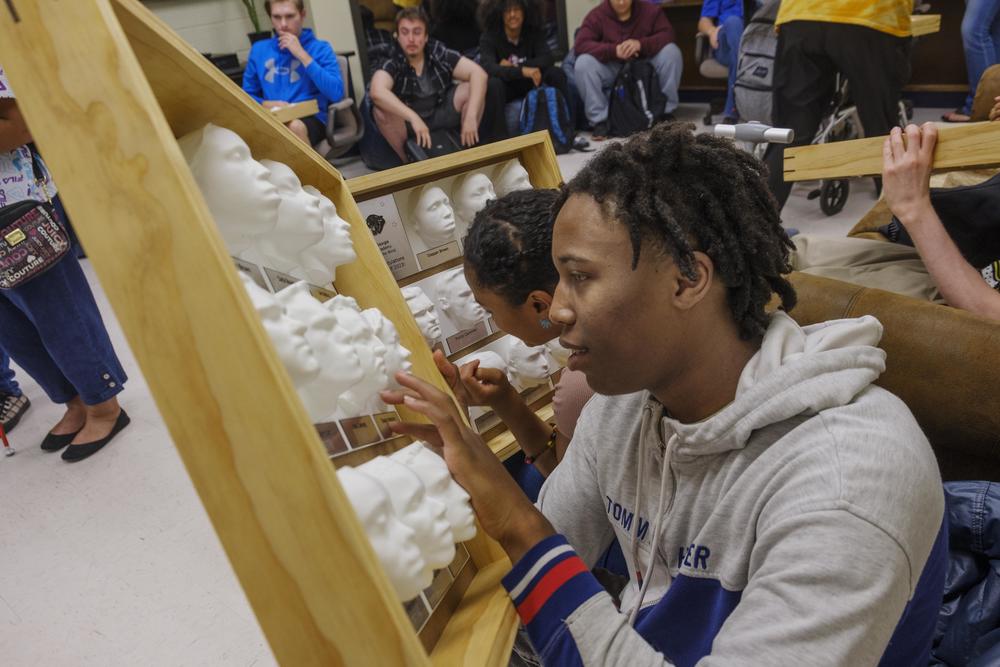
Section Branding
Header Content
Georgia Today: Stories you may have missed in 2023: Sea turtles; Punk Black; Yearbooks for the blind
Primary Content
On the Monday, Dec. 25 edition of Georgia Today: Sea turtles in Georgia had a really good year; Macon will soon be the home to a health care center specifically for people with intellectual and developmental disabilities; and what do yearbooks look like at a school for the blind?

Peter Biello: Welcome to the Georgia Today podcast from GPB News. Today is Monday, Dec. 25. I'm Peter Biello. On today's episode, we'll look back at some of the stories you might have missed during the past year. Sea turtles in Georgia had a really good year. Macon will soon be the home to a health care center, specifically for people with intellectual and developmental disabilities. And what do yearbooks look like at a school for the blind? These stories and more are coming up on this edition of Georgia Today.
Story 1:
Peter Biello: As we wrap up 2023, we're bringing you some of our most noteworthy stories from the past year. In the first of those, the city of Macon will be the home to a one of a kind center for people with intellectual disabilities. GPB's Sofi Gratas reports.
Sofi Gratas: Georgia's State Department that oversees mental health services is partnering with a Macon-based provider to open a health care center for people with intellectual and developmental disabilities. Leaders say it's the first of its kind in the country. Over $7 million from the state is funding the construction of a 16-bed crisis unit in Macon for people with intellectual and developmental disabilities, or IDD. The center will be run by Macon's River Edge Behavioral Health. Commissioner of the Department of Behavioral Health and Developmental Disabilities, Kevin Tanner, says too often people with IDD are going through a behavioral health crisis, get stuck in emergency rooms without proper care.
Kevin Tanner: That's not the proper place for them. They need to be somewhere they can have the right treatment and the people who understand how to treat them properly. This facility is going to be one of a kind. It's going to be the first of its kind, and I think it's going to become a national model.
Sofi Gratas: Tanner says the center will also offer inpatient and outpatient services and be a temporary stop on a longer road toward permanent housing and care. For GPB News, I'm Sofi Gratas in Macon.
Story 2:
Peter Biello: Sea turtles enjoyed a much more successful year than expected here in Georgia. GPB's Benjamin Payne filed this story back in early November.
Benjamin Payne: Sea turtle hatching season in Georgia officially ended Tuesday, capping a banner year for the threatened species. About 160,000 hatchlings emerged across the beaches of Coastal Georgia through October. Georgia Sea Turtle Center research manager David Zollo is pleasantly surprised. He had been expecting a lower number since last year as a high point after which many sea turtles take the next few years off.
David Zollo: We're seeing about a 3% to 4% increase in nesting each year, and it just shows to me that dedicated long-term conservation and management actions can pay off. We're not approaching historic levels yet. We likely won't for another 15 or 20 years, according to some demographic models. But it's a sign that we're on the road to recovery.
Benjamin Payne: On Jekyll Island, where the Georgia Sea Turtle Center is located, three sea turtle moms returned unexpectedly after nesting just last year. Their names: Rogue, Justice and Dos Equis. For GPB News, I'm Benjamin Payne.

Story 3:
Peter Biello: Rock music fans of color have been looking for more diversity on stage. Punk Black is an organization founded to highlight people of color in the rock music scene, and they're taking that mission further with a new music label. GPB's Amanda Andrews brings us this audio postcard featuring members of Punk Black Records' newly signed bands, each made up of rock musicians who are also people of color from the South.
Awleen Knight: I was always kind of ostracized, like, "Oh, you're trying to be white." You know, "Why are you listening to that white people's music?" I always wore all black and all that. So it just feels nice to just kind of be, you know, as I've always been. But it's just the right time, you know? My name is Awleen, and I'm the lead singer of The Rack.
[MUSIC]
Awleen Knight: We were really mostly only allowed to listen to gospel in my younger years. It took me, like, getting fired from my, like, kind of racist boss that I like went home one day and I just started jammed into these rock instrumentals. And I started screaming for — for the first time.
[MUSIC]
Russell Denny: I been playing in this scene since 2005, and I've seen how it all changed in 2005 to now. My name is Russell Denny, the drummer for The Rack. When me and Von was playing guitar in front of Big Lots, everybody always call us and say, "Hey, why are you guys playing rock music?" I was like, "Because we want to."
Von Phoenix: I am Von Phoenix from Punk Black and Howling Star. For Punk Black. I would be the president, although I consider myself more of the architect. And for Howling Star, I'm the lead guitarist and the person who speaks the most.
[MUSIC]
Von Phoenix: The sounds we go for at Punk Black Records just stem from people just being dope. Just because we — we love so many different types of rock music. Howling Star is more, I would say we're more experimental funk rock. Like Hijas de la Muerta is more — it's sort of like punk alternative. The Rack has like a lot of multiple sounds. I would just like, identify them as just rock, not to just like, say, like, "Oh, they only do rock," but they just do all the genres that are encompassing rock.
Awleen Knight: How y'all feelin' out there?
Carlos Laquanous: My name is Carlos Laquanous and I'm the bass player for The Rack. We're trying to get it to the point to where it's the full-time job and we don't have to work no more. That's 'cause this is our job; it's just we have to do other stuff to pay the bills. But this is our — this is our occupation. It's our profession. With representation, people treat you slightly different. They treat you a little better than when you come in unrepresented. So that's been the main thing so far is our level of gigs, steadily been climbing up.
[MUSIC]
Carlos Laquanous: It's hard to fake rock. It's one of those genres where so many people that's in the crowd play guitar, bass, drums and sing. So it's one of those type places where, you know, if you're really kickin' it live, people appreciate it.
Awleen Knight: I want the audience to feel like they are watching a classic rock band, like they've seen Bon Jovi or KISS or some crazy favorite of their own. You know, I want to be their new favorite.
Story 4:
Peter Biello: Carson Garrett, a 21-year-old Georgia Tech student, experienced a once in a lifetime opportunity when he joined the cast of Survivor. GPB's Sarah Kallis has more.
Sarah Kallis: Garrett says he comes from the, quote, "biggest community of Survivor fans" in his home city of Rome, Georgia. He credits his community and problem solving skills for supporting him throughout the competition.
Carson Garrett: I was just really proud of myself for, you know, putting myself as an introvert on this game built on social relationships and excelling. And so it was pretty intimidating at first. But as I got into the groove, I was — I felt very comfortable.
Sarah Kallis: Garrett gained thirty pounds in preparation for the show and said he's adjusted to his normal life after the game. He is entering his fourth year as an engineering student and is interning at NASA in Houston. For GPB News, I'm Sarah Kallis.

Story 5:
Peter Biello: Back in May, GPB's Grant Blankenship brought us this story of how Mercer University engineering students have been using technology to create yearbooks for the Georgia Academy for the Blind in Macon.
Grant Blankenship: Yearbooks and yearbook photos are a huge part of how we remember our school years. But for visually impaired students, capturing the physical essence of friends is a challenge. Now, modern technology is helping meet the need.
When Daquan Brown was handed his yearbook, he could hardly believe it.
Mercer University engineering student Hannah Higgins: Your head is right here. This one's yours. You can just touch it with your hand. That's your face.
Daquan Brown: I get to keep this?
Hannah Higgins: Yeah. Oh, yeah.
Daquan Brown: Oh, factual? I'm talking about the whole thing?
Grant Blankenship: What he held was a box about two feet by two feet with 11 little heads mounted inside, one for him and each of the other seniors at the Georgia Academy for the Blind in Macon.
Daquan Brown: It's like bobbleheads, but it's, like, myself.
Grant Blankenship: And Daquan says as bobbleheads go, these are good.
Daquan Brown: It looks like me. That's crazy. Like, it's me.
Grant Blankenship: This is the sixth year Mercy University engineering students like Katie Puckett have been creating these 3D yearbooks.
Katie Puckett: You have a handheld 3D scanner. We go around their faces to get the model.
Grant Blankenship: The model is printed in plastic that looks like a lightly ridged marble bust that could fit in your hand. Names are printed in Braille underneath.
Student: Bruh. That junk look just like you, bruh. Bruh, it look just like you!
Grant Blankenship: A graze of fingers across the forehead helps Shayla Hampton find her likeness.
Shayla Hampton: Yeah, I could tell this one's me because of my hair.
Grant Blankenship: She says she's not sure what she's going to do with this yearbook yet, but —
Shayla Hampton: Knowing my mother, she probably going to hang it up on a wall.
Grant Blankenship: Proud moms can be like that. For GPB News, I'm Grant Blankenship in Macon.
Peter Biello: And that's it for this edition of Georgia Today. If you want to learn more about these stories, visit GPB.org/news. And remember to subscribe to this podcast that way will pop up automatically in your podcast feed tomorrow. If you've got feedback or a story idea, we would love to hear from you. Email us. The address is GeorgiaToday@GPB.org. I'm Peter Biello. Thanks again for listening. We'll see you tomorrow.
---
For more on these stories and more, go to GPB.org/news



